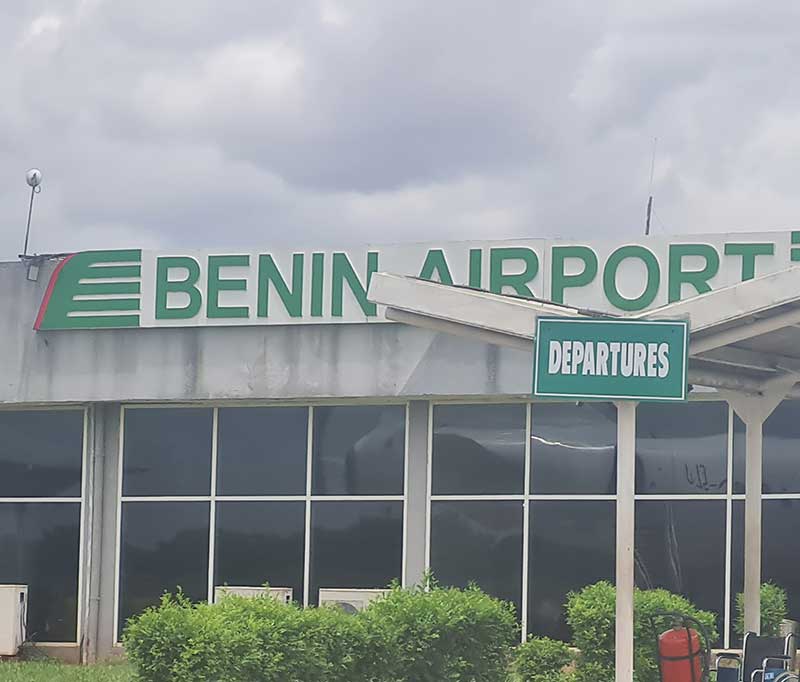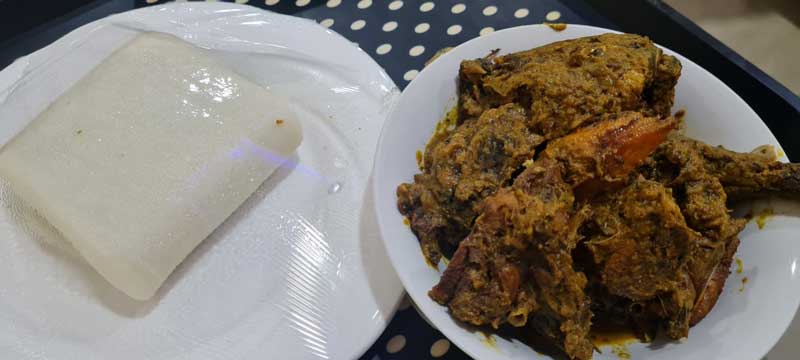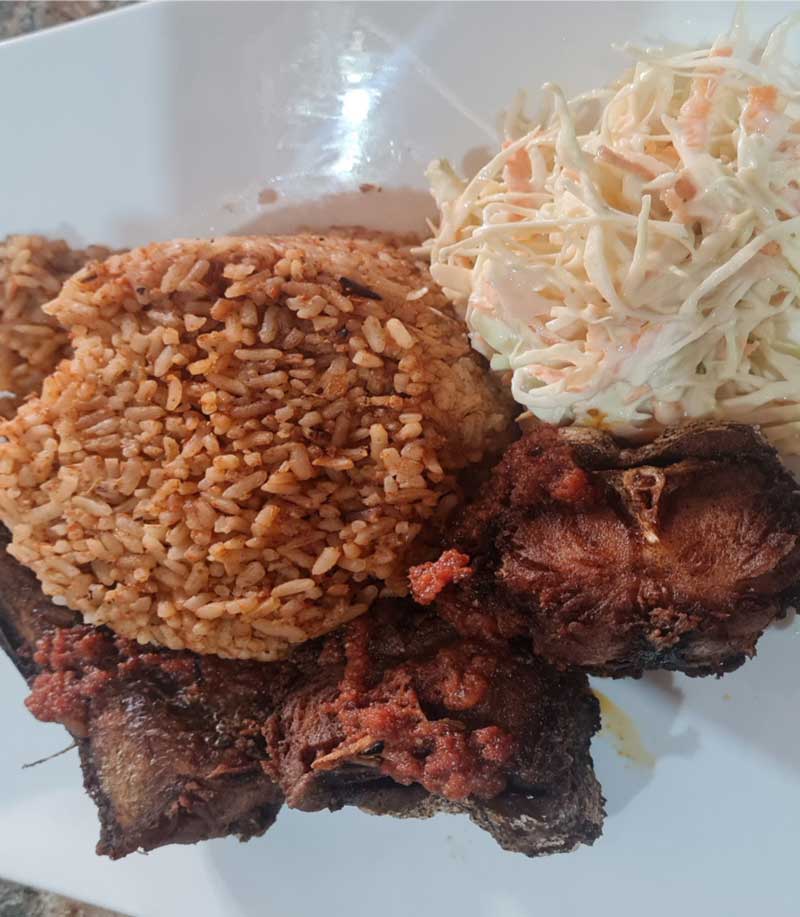Naira, Naira: last stop, Benin City
6 July 2023

Faith Mkwananzi and Yusra Price
Movies we see on TV, the bikes, the traffic, the busy people each getting on their daily lives. The musicians we know, Burna Boy, Wizkid, Davido, and many more whose songs we only know… Then hearing about Egusi soup and jollof rice can only lead to wandering. Wondering about the atmosphere, the food, the music, the people, and a motorbike ride. So, a trip to Nigeria had always been something that we both had to tick off our bucket list at some point. The Ibali project storytelling fieldwork on educational inclusion with young people and teachers presented an opportunity to do so.
The first stop is at the busy Lagos’ Murtala Muhammed International Airport, filled to the brim, with scores of people, resembling the world’s 21st-century diversity. Of course, it’s an airport, with winding queues. There were a few more ‘jet-ins’ at that time of the day, people talking at the top of their voices, in unbearable heat, sweating through their hair down to their toes, and everybody fanning themselves using their passports or papers that will get them into the land of Naira. As we entered the congested room, we could not hold it in anymore. “Sorry, sis! We need the bathroom”, we said to a woman with a jaw-length hairstyle, straight strands and coloured in hues of red. She took us through the crowd of people with occasional nods to her colleagues, who looked questioningly at her as she guided us through.
Before we returned to the crowd, she gave us a proposition. She asked if we would like to go to the front of the line and, in exchange, just give her something nice. Our first encounter with “something small-small”. With sweat dripping down our own toes, we agreed and seamlessly made our way through the crowd, down the concrete steps and into an empty line. With our yellow cards in hand, filled out in our smallest handwriting, we took turns visiting the inspection officer who asked if we had something sweet for him too – even in South African Rand is fine. We were slowly becoming familiar with an unspoken social expectation of us, as foreigners, to exchange favours for favours.
‘Sit down!’ was the order of the day in the office where they issued the ‘visas on arrival’. One of us was unfortunate to have to go through that process. To that instruction, people, young and old, ‘sat’ like chickens that had been rained on. It’s the heat—the loud instructions- the up and down of people. Of the multitude of people in there, some were confused about what forms to submit, and some looking for places to print or make copies of documents. On the other side, Yusra waited with a bit of apprehension for her bags to descend from the conveyer belt and scrolled through numerous unfamiliar wifi options to let the rest of our Ibali team know that Faith was momentarily held back. Finally, a kind worker offered his own login details in exchange for something nice – at the time, just a lot of gratitude and a smile could be mustered. An hour went by, and the terminal became empty when finally, we were both on the other end and able to leave.
Exiting the busy airport, two hours later than we would have liked, we made the grand entrance to the home of millions of motherland beautiful faces was finally a milestone we have now reached, parking the thought of a long Ibali week ahead, we gazed at the very clear skies, trying to figure out how our bodies could adjust from the cool air in the Ethiopian airways to the penetrating heat of the ever so busy Lagos. Walking towards the airport, looking for a pink dress (which our friend was wearing) among the crowd, we strolled past a group of men carrying batches of cash… Naira, Naira. We only had our bank cards – no USD. No Rands. How could we buy the Naira with our bank cards? We wish we had known beforehand that tangible cash was a preference and bank cards did not have much use.
We found our friend, Jane, in her pink dress, waiting for us like a single flower growing, brightly and softly, out of the concrete. Again, many people flurried towards us, asking if we wanted Naira or a taxi, but with our pink flower, we entered the parking area and got into the taxi she had arranged for us. As we drove through Lagos, the landscape was populated with lots of people walking, getting in and out of taxis, selling ice-cold water to thirsty commuters (including us) and stalls of food, mangos, electronics, cooking utensils, clothing and more. The freeway/highway had solid barricades in the middle, and U-turns were part of navigating the roads. Road lanes? Just a guideline. An almost collision? Just a concern for someone unfamiliar with the driving etiquette of Lagos roads. We finally made it to Jane’s place, which sat in an apartment block behind a heavy gate. A security guard was tucked in a small booth that was relatively dark and probably cool. Yusra took a nap to make the hours until iftar (the time to break her fast during sunset prayer) go by faster, while Jane and Faith sat in the lounge and, later on, visited the pharmacy. As the night came, the athaan (Muslim call to prayer from the mosque) could be heard in the distance. “Finally!” Yusra could eat. A big plate of rice, fish and sauce was welcomed and so delicious. To our delight, the mangos were exquisite! Peel and all! Next stop, Benin City.
We took a taxi the next morning and drove through the technical college and the University of Lagos. The statues were intriguing because they did not have that colonial “feel”. Instead, they felt like local representations of people and experiences without colonial interference. We drove past beautiful dresses and shirts and pointed out the ones we really wanted. We got to the airport and made our way to the gate. Again, “something sweet” greeted us. As we lined up to board the plane, two different groups of people on separate flights were loaded onto the same buses. Confused, we looked at each other and decided to go with the flow. “Flight to Benin City get off here please!” This was an amusing realisation that we were getting dropped off at our plane while the other people were getting off at theirs. We greeted Lagos and got onto Air Peace, the first and last time, the airline delivered on their promise to leave and arrive on time. Every flight after that created numerous issues for us, including a delayed flight home.
We won’t make our experiences with Air Peace spoil the beauty of our experience. Nigeria is a beautiful country with great food and beautiful people who always wear warm and smiley faces, always willing to help and answer questions. You will certainly feel genuine care, concern, and welcome. Embrace it, most mean it!
Six lessons from us
Lesson 1:Have a bit of cash with you
Not all places have international automated teller machines and have some cash, and except you are a local, it would be difficult to understand how Mobi money works. Had our friend in the pink dress been away on an emergency, we wouldn’t have left the airport.
Lesson 2: Keep up with current affairs and requirements
Except if it’s an emergency, preparing all documents and finances in advance would save everybody a bit of time, energy, and, most importantly, some dignity. This goes for every country one visits, but do not overlook this bit… check the visa requirements and the possibility of getting a ‘Visa on Arrival,’ which you can apply for online before departing. But, if you can avoid it, get the visa before departure because the queues can be very long, take a while, and might not work if you have a local connecting flight. For visa: visit the Nigerian Visa Services here: https://immigration.gov.ng/
Lesson 3: Explore travel options in advance
Plan your trip and activities well if there are travel connections involved. Leave room for flexibility. Depending on where you are going in the country, explore whether you will need to travel by road, air, or taxi. Most locals fly within the different states but be sure not to choose an airline whose norm is to cancel flights or re-schedule times because that can be a HUGE inconvenience financially and timewise, especially if you must catch an international flight. If they re-schedule the local flight- you have the burden of rescheduling your international flight- at your own cost, and you must book a hotel at your own cost. An airline that colleagues used which were not canceled: https://www.greenafrica.com/en-us/
Disclaimer, our suggestion is based on our experience, so things might change.
Lesson 4: Think about, and sort out communication channels in advance
It will be hard getting a local sim card, so you’ll find yourself travelling around in local transport without any means of communicating. Find out if roaming on your regular service provider is possible or some other alternative.
Lesson 5: Be vigilant
There will always be a few that will ask if you have something ‘small-small’ for them. You might be confused about what this is; it’s anything to appreciate or show love, as some would say.’ Left to wonder what anything means. Maybe some Naira? But it could be anything. Almost anyone and anywhere might ask for something, even at the airport, from the person who cleans the bathroom to the immigration official. Also, sometimes people escalate prices when they see that you do not understand the currency or the purchasing system (which happens in many other counties, too!). Having our local friend with us helped us navigate well around, she would be the one asking about the prices of things wherever we went. When she was not there, a taxi driver agreed that the taxi was 5,000 naira to the hotel, but when we got to the hotel, he was bargaining for 6,000 naira, saying he needed to buy food. Be careful and pay attention if someone is soliciting a bribe or genuinely asking for ‘something’ because they are hungry. You should be able to tell the difference.
Lesson 6: Be open-minded to learn and explore!
There are diverse cultures and ethnic groups in Nigeria, so be open to learning about these. Also, be certain that, and be open to learning that might work differently from where you come from. Depending on where you are, also be aware that sometimes there will be limited wifi, there are power cuts, and most places use generators, which, if you a fussy, can be considered noise pollution. People drink bottled water and do the same. Of course, it’s in a tropical area, so take your anti-malaria tablets for precaution. Try out the different types of foods (especially the soups!) and learn about the different states and cultures. The locals take great pride in the food, and it’s amazing! Try jollof rice, coconut rice, and all the soups! especially the catfish pepper soup, egusi, banga, bitter leaf, seafood okra, and black soup. If you are open to diversity and appreciate learning about other contexts, you will enjoy your stay!
See our experience below:

‘Swallow’ (Cassava fufu) and soup

Jollof rice and chicken

Jollof Spaghetti
.jpg)
